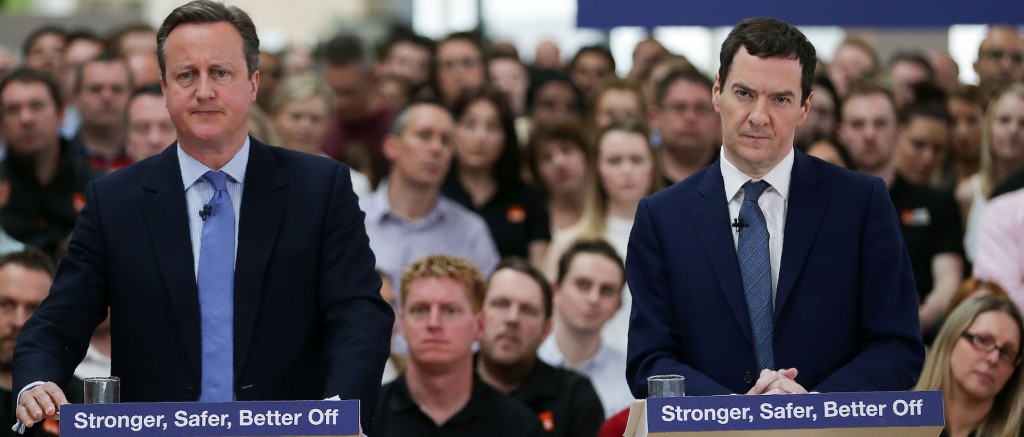In a month’s time the UK will hold a referendum on whether to stay in the European Union or not. Ahead of the vote, a debate is raging in which two issues - immigration and the economy - are taking centre stage – but with both sides using increasingly extreme scenarios as to what the future may look like, it’s becoming almost impossible for people to know which way to go.
According to one poll, 55% of Britons now say that the future of the economy is one of the most important factors influencing their decision. The problem is that this debate is about more than just number crunching. It’s time politicians were more honest about the assumptions and values they’re basing their ‘forecasts’ on.
A spot of DIY
This week Prime Minister David Cameron and Chancellor George Osborne gave a speech claiming that 500,000 jobs would be lost, wages would fall, the value of people’s homes would decrease, and the government would have to borrow more money if we left the EU. It was all pretty gloomy.
But they weren’t finished there. Leaving the EU, they said, would be the first time that anyone had ever brought about a recession on themselves - a DIY recession. And guess where they delivered the speech? At the headquarters of DIY retailer B&Q (above). See what they did there?
Not to be outdone, the Leave Campaign wheeled out Steve Hilton ( the man who persuaded Cameron to run for leader of the Conservative Party in the first place!) to make the case for getting out. He argued that being part of the EU made the UK “ungovernable”. He joins a number of high-profile Tory politicians like Boris Johnson, Liam Fox and Iain Duncan Smith, who all think leaving is the best option. Once-happy families have been torn apart, with everyone accusing the other side of foul play.
So who on earth should voters trust? How should they assess which arguments add up? How can they believe either side’s predictions (when it seems like we’re barely even able to predict the weather sometimes)?
So how does predicting the economic future actually work?
Well, it’s complicated. No surprise there then. The economic forecasts from the UK Treasury report at the heart of the debate are based on a model called NiGEM, which is used by many of the big economic organisations, like the IMF and the Bank of England. So take the NiGEM model and chuck in something called the vector autoregressive model (VAR) and voilá: you're all ready to predict how the uncertainty and financial instability caused by Brexit will affect the economy. As an additional feature, add ‘ready reckoner’ models to predict the impact of changes to the economy on the government’s finances and you’ve basically predicted the future. Easy!
It’s as good as a foreign language to most of us. No one can really explain it and it’s never really scrutinised in the news - for one very good reason: it’s totally baffling! It even confuses economists. What’s more, it’s not exactly 'selling newspaper' material.
Making informed decisions about which way to vote becomes really difficult when this is the method used to do it. People wouldn’t be comfortable with a doctor offering different treatment choices to a patient if he or she was speaking a language that the patient didn’t understand, so why is it OK when it comes to a debate over the future of the economy?
In the case of the Brexit debate, it seems the only choice for voters is to believe either the 'weight of [economic] evidence' that the Remain side sets out, or to discount it all as ‘propaganda', as the Leave campaign asserts.
What should be done?
The challenge is to create the circumstances in which the public debate actually helps voters understand and scrutinise the arguments.
To do this, economists and politicians have got to be more open about the values and assumptions behind economic arguments, rather than simply presenting each side of the argument as fact. They should clearly highlight the limitations of the forecasts on which they base their speeches. Spaces in which individuals and communities can discuss these issues with each other without being mediated by politicians, journalists or economists would also help to build a culture of real debate.
A future like this might be hard to imagine now in the middle of a fist-fight about the future of Britain in the EU. But until we find a way to do it we’ll just have to decide who’s telling the truth about the economy based on who comes across as most (or least) trustworthy. And that doesn’t bode well for democracy.
Joe Earle is a freelance researcher, writer and a trustee of Economy. His forthcoming book Econocracy: The perils of leaving economics of experts will be published will be October 2016.
This article was written in British English




